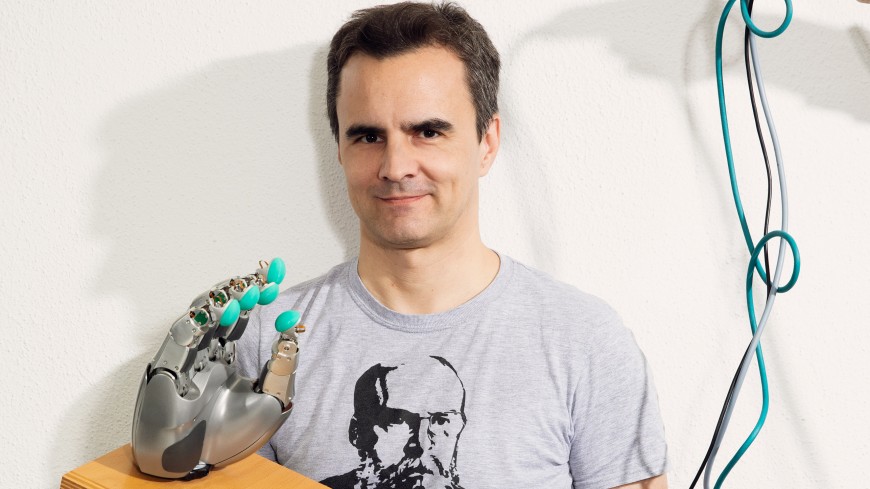Artificial Intelligence for flexible robots
Proof of Concept: Professor Peters receives 150.000 euros from European Research Council
2020/07/28 by Silke Paradowski
Professor Jan Peters has been awarded a “Proof of Concept” grant of 150,000 euros by the European Research Council (ERC). He receives the award for his project “AssemblySkills”. The aim of the project is to give robots the ability to learn autonomously with the help of artificial intelligence.´

Present-day robots are made for the purpose of repeating several tasks thousands of times. To make robots more widely applicable, future robots need to be able to do thousands of tasks just a few times. Programming a robot to solve just one complex motor task has remained a challenging, costly and time-consuming task – artificial intelligence is rarely employed. In fact, manual programming has become the key bottleneck in robot use. Empowering robots with an artificially intelligence approach to autonomously learn such tasks is at the center of the new ERC Proof of Concept project “AssemblySkills”, which aims to validate that an autonomous, intelligent skill learning system can enable robots to acquire and improve a rich set of motor skills for specific applications.
ERC Proof of Concept project „AssemblySkills“
The ERC Proof of Concept project “AssemblySkills” builds on the artificial intelligence methods developed within the ERC Starting Grant “SKILLS4ROBOTS – Policy Learning of Motor Skills for Humanoid Robots”. The latter has yielded a structured, modular control architecture that has the potential to scale robot learning to more complex real-world tasks. In this modular control architecture, elemental building blocks – called movement primitives, are being adapted, sequenced or co-activated simultaneously to fulfill the robot’s tasks.
Within the Proof of Concept project “AssemblySkills”, the goal is to group these modules into a complete software package that can enable application-driven robots to learn new skills – particularly in assembly tasks. The value proposition of the project now funded by the ERC Proof of Concept grant is a cost-effective, novel machine learning system that can unlock the potential of manufacturing robots by enabling them to learn to select, adapt and sequence parametrized building blocks such as movement primitives. The approach of Professor Jan Peters’ research team is unique in the sense that it can acquire more than just a single desired trajectory as done in competing approaches, capable of save policy adaptation, requires only little data and can explain the solution to the robot operator.
Proof of Concept Grant
Proof of Concept is a supplementary grant to the research grants of the ERC. It is aimed exclusively at scientists who already hold an ERC grant and who want to pre-commercialise a research result from a current or completed project. This is the first step towards a technology transfer. The aim of a Proof of Concept project is to check the market potential of such an idea. So rather than funding research activities with it, the ERC finances measures for further development with a view to the maturity of application, commercialisation or marketing of the idea. In the most recent funding round, 55 researchers from 11 countries were awarded an ERC Proof of Concept grant. The grants are part of the EU’s Horizon 2020 research and innovation programme.
Vita: Professor Jan Peters, Ph.D.
Jan Peters has been Professor for Intelligent Autonomous Systems at the Department of Computer Science at the Technical University of Darmstadt since 2011. He is one of the leading experts on artificial intelligence in robotics in Europe and has been awarded numerous important “Early Career” prizes. In 2015, he won an ERC Starting Grant for his project SKILLS4ROBOTS, on which the Proof of Concept Grant is now based. Peters studied computer science, electrical and mechanical engineering in Munich, Japan, Singapore and Los Angeles. He received his doctorate in computer science from the University of Southern California (USC). After graduating from USC, Jan Peters became a full-time Senior Research Scientist and Robot Learning Group Leader in the Department of Empirical Inference at the Max Planck Institute for Biological Cybernetics and the Max Planck Institute for Intelligent Systems.

